- Home
- Susan Hill
The Service of Clouds
The Service of Clouds Read online
Contents
Cover
About the Author
Also by Susan Hill
Praise
Dedication
Title Page
Epigraph
Part One
Chapter One
Chapter Two
Chapter Three
Chapter Four
Chapter Five
Chapter Six
Chapter Seven
Chapter Eight
Chapter Nine
Chapter Ten
Chapter Eleven
Chapter Twelve
Chapter Thirteen
Chapter Fourteen
Chapter Fifteen
Chapter Sixteen
Chapter Seventeen
Chapter Eighteen
Chapter Nineteen
Chapter Twenty
Chapter Twenty-One
Chapter Twenty-Two
Chapter Twenty-Three
Chapter Twenty-Four
Chapter Twenty-Five
Chapter Twenty-Six
Chapter Twenty-Seven
Chapter Twenty-Eight
Chapter Twenty-Nine
Chapter Thirty
Chapter Thirty-One
Part Two
Chapter One
Chapter Two
Chapter Three
Chapter Four
Chapter Five
Chapter Six
Chapter Seven
Chapter Eight
Chapter Nine
Chapter Ten
Chapter Eleven
Chapter Twelve
Chapter Thirteen
Chapter Fourteen
Chapter Fifteen
Chapter Sixteen
Chapter Seventeen
Chapter Eighteen
Chapter Nineteen
Chapter Twenty
Chapter Twenty-One
Part Three
Chapter One
Chapter Two
Chapter Three
Chapter Four
Chapter Five
Chapter Six
Chapter Seven
Chapter Eight
Chapter Nine
Chapter Ten
Chapter Eleven
Chapter Twelve
Chapter Thirteen
Chapter Fourteen
Chapter Fifteen
Chapter Sixteen
Chapter Seventeen
Chapter Eighteen
Chapter Nineteen
Chapter Twenty
Copyright
About the Author
Susan Hill was born in Scarborough and educated at King’s College, London. Her novels include Gentleman and Ladies, I’m the King of the Castle (Somerset Maugham Award), Strange Meeting, The Bird of Night (Whitbread Award), A Bit of Singing and Dancing, In the Springtime of the Year, The Woman in Black, Air and Angels, The Mist in the Mirror and Mrs de Winter. The Woman in Black has been adapted for the stage and has been running in the West End since 1988. Her children’s books include Can It Be True? (Smarties Prize), The Glass Angels and King of Kings.
Susan Hill lives in Gloucestershire with her husband, the Shakespeare scholar, Stanley Wells, from where she runs her small publishing company, Long Barn Books.
ALSO BY SUSAN HILL
Fiction
Gentleman and Ladies
A Change for the Better
I’m the King of the Castle
The Albatross and Other Stories
Strange Meeting
The Bird of Night
A Bit of Singing and Dancing
In the Springtime of the Year
The Woman in Black
The Mist in the Mirror
Mrs de Winter
Air and Angels
Non-Fiction
The Magic Apple Tree
Family
Children’s Books
One Night at a Time
Can It Be True?
The Glass Angels
‘Remarkably enjoyable … Terrible, heart-stopping moments, and rendered by a master story-teller … Enjoy Susan Hill’s enduring sense of the numinous’
Sunday Telegraph
‘Beautifully written and intensely sad. Disappointment, evanescence, death, are seen poetically and so given dignity and calm’
Daily Telegraph
‘There is no denying the power of Hill’s work and the bravery of its unblinking gaze’
Evening Standard
‘Movingly and sensitively wrought, this latest novel from one of our most spiritually observant writers penetrates new layers of human entanglements and desires…Told through a carefully controlled double narrative, this compelling novel explores emotional deprivation and its effects through the generations’
Good Housekeeping
‘This beautifully written, unusual novel is a condemnation of what is done – or not done – for the dying … a tale of exquisite honesty. The writing is ravishing … The novel is a model of restraint, of nuance and of truthfulness’
Country Life
For Jessica and Simon
The brave ones.
Susan Hill
THE SERVICE
OF CLOUDS
Out of perfect light and motionless air, we find ourselves on a sudden brought under sombre skies, and into drifting wind; and with fickle sunbeams flashing on our face, or utterly drenched with sweep of rain, we are reduced to track the changes of the shadows on the grass, or watch the rents of twilight through angry cloud … The aspects of sunset and sunrise, with all their attendant phenomena of cloud and mist, are watchfully delineated; and in ordinary daylight landscape, the sky is considered of so much importance, that a principal mass of foliage, or a whole foreground, is unhesitatingly thrown into shade merely to bring out the form of a white cloud. So that, if a general and characteristic name were needed for modern landscape art, none better could be invented than ‘the service of clouds’.
John Ruskin, Modern Painters
PART ONE
One
‘Where am I?’
‘Well, you’re in your bed.’
‘Not my bed.’
‘Are you not comfortable, dear?’
‘Not your dear.’
A thread of spittle worked its way down a seam in the flesh beside her crumpled mouth.
‘Where am I?’
‘In the hospital. Let me just wipe your chin now.’
‘Who am I?’
‘Well, you’re Mrs Annie Hare.’
Silence then. The young nurse with red hair wiped the mouth of the old woman, Annie Hare, and looked at the clock, which made no sound either, and twitched the top sheet and the hand that rested there, yellow as a chicken’s claw, twitched with it.
‘Who am I?’
‘You’re Annie Hare.’ She hated to sit with the dying.
Rain beaded the windows, and slipped down them, making no sound.
‘Who was I?’
The girl panicked then and rang the bell and ran for Sister.
(Later, at home, the story would expand, puffed out by her own little hysteria. She would say that the old woman had known, hadn’t she, had surely been given some vision or other premonition of her own impending death. Who was I? she said, not Who am I? ‘which you could easily understand, oh, that happens almost every day with people who are delirious, in some bit of fever or other, you don’t have to be dying to lose yourself temporarily’. No, it was, Who was I? She knew then. They do.)
‘Who was I?’
They had telephoned him, even at half past one in the morning.
She was his patient; it was not that they needed him.
‘He’ll come,’ the Sister had said, snapping the curtains sharply around the bed rail.
The old woman did n
ot start; she had slipped way down beyond sudden noises now.
‘There won’t be anything he can do, will there? Why ever would he bother coming?’
‘He likes death,’ she said, and turned her back on the girl and walked away down the long room.
(Which would make more to tell, in the confident, off-hand tone of one who knew about all such things, the tone of voice that impressed the girl’s father and made her mother proud and her brothers sneer. ‘He likes death, that doctor. Well, some do, it’s well known.’ Though she herself could not fathom it, not in any way.)
The ward was half empty. Flat, un-pillowed beds were lined against the window, with great spaces in shadow. The girl moved closer into the sheltering circle of light around the desk. She was nineteen. She hated the night duties when one of them was dying.
*
Molloy got out of his car and stood for a long time in the dark quadrangle. The air smelled sweet and mild; there was rain in it and smoke on it. But not the sea here. He lifted his face, to feel the slight movement of the damp air, looked at the steps that led up to the swing doors, and the lights showing through the yellowing curtains. Thought: There is this night; there will be a few dozen more. After that, I shall not belong here. I will never come to this place again, and in a while the place itself will not be here.
(It was to be demolished, the old buildings were done with now.)
He turned his head quickly, as if it would help him turn his mind from it too. It was unimaginable to him, and painful beyond bearing, though he could have expressed none of it. He looked vaguely into the darkness towards the bushes beside the drive, but saw nothing except old images, revolving and shifting behind his eyes.
When he opened the doors into the hospital, the smell of it drowned him, the smell he had known as the background to his life, every day, every day – scrubbed sluices and antiseptic floors, sheets and sick bowls and the rank stems of flowers, and sweet, faecal decay.
He heard his own footsteps, coughs, the wind sighing suddenly at the door, saw the shaded light at the end of the ward, and felt a great surge of joy and rightness and satisfaction at where he was, and at his own place here, before the bleak misery seeped into the edges of it, souring it, blotting it out.
He put his hand up to the door of the ward and held it there, staring at the shape of his outspread fingers against the wood, and thought suddenly that at the moment of his own dying he might see something so ordinary as this, in the last flaring of the light. Then went on, into the quiet, waiting place.
They had pulled the curtains right round the bed so that, within the narrow cubicle, he was alone with the old woman. They knew better than to come near, or in any other way to disturb him.
It was as though the air was slowly leaking out of her body as she breathed little, shallow breaths, so that she seemed flat beneath the sheet. Her hands were clutched to the cover, as a baby will clutch close to its own face, her skin smooth and almost transparent to the bones below, the flesh already receded.
But she was not dead. The pulse still leapt at the side of her neck and, now and again, swallowing moved the knotted gristle under the skin of her throat. She was Annie Hare. He knew nothing about her. By the time she had come here, there had been little for him to do, which was so often the way. Only the old came to this place now. It made no difference to him. When his patients were dying, he came to them, sat beside them, watched and waited for death with them, and could not have kept away.
If he was too late, away somewhere, or it happened too suddenly, he felt a frayed, hollow sense of having uncompleted business that would now have to be carried within him forever. Whether they were aware of him or not did not signify, nor what others said or felt. He was called a saint, and a conscientious caring doctor – or else he was thought odd, and his consorting with death disturbed and puzzled them. None of it mattered. No one spoke to him about it. They were not close to him, nor party to his thoughts.
He loved the sense of concentration, like the beam of light from a torch, focused on this spot, the stillness and expectancy, the feeling that everything that had ever been in this one human life was packed now into the smallest space, as he sat quietly on the hard chair, hunched close to the bed. It was unchanging, though the people changed, and where he wanted to be, where he felt rooted and belonging, even if they themselves meant little to him. Every so often, he reached for the claw on the sheet and held it, slipped his thumb over the parchment skin, feeling the thin blade of bone beneath.
He did not enquire about family. If they came, they came. He would not see them, the Sister had to do with all of that. It was none of his concern. This was his concern – the woman in the bed, and her dying, and his own nearness to it. He felt death sidle into the cubicle and settle down to wait a little with him, before moving in.
From the first time, he had felt its absolute importance to him, to sit in silence like this, watching for the tide to turn, and been overwhelmed by the certainty that this small, uninteresting space contained everything of significance. Within it, time shrank to a pinpoint, steadied and was still, the focus of the past, present and future, at the centre of the turning world. (So that when he left afterwards, he was dazed and bewildered by the ordinariness of life in the streets outside, the unregarding movement sweeping by. He could not get his bearings straight away, but had to go somewhere to be alone, adjusting gradually, like a revenant waking, a traveller returning from long away. As a student, he had walked the night streets in every weather, cycled far out into the hills overlooking the water, or simply stayed on his own bed, staring at the wall, or into the neutral darkness.)
It was not true that death always came quietly, and met with no resistance. But this, tonight, would be quiet, and so he would simply sit by, watch, wait.
The wind caught at the casement suddenly and shook it by the throat to gain entrance, and, once it was there, prowled about the old, half-empty building, pushing at doors, lifting floorboards a little, restlessly, and like the wind, the old woman, Annie Hare, moaned and shifted on the pillow. Her nose was hooked like the beak of a bird, the flesh seemed to be dissolving as he watched. The skin was taut across her forehead.
And the wind raced across the roof and keened in cracks and probed with thin fingers beneath slates, and out in the ward, some slight movement, a voice, a demand attended to. Silence again. The Sister sat at the desk within the circle of light.
The girl had been sent down to the store, two flights of stone stairs, past closed doors, which unnerved her, but in a different way from the presence of the dying. She could endure being spooked, like a child would be, by mere shadows and hollows and empty corridors.
The wind dropped, gathered itself again. But the next gust came to nothing, and the building fell quiet.
Molloy shifted heavily on his chair. He was watching intently, sensing some slight change, seeing the old woman’s breathing subside. He touched her hand. ‘Annie Hare,’ he said softly, for reassurance, encouragement. There was a response, the faintest stir within her like an electrical charge, just perceptible to him.
‘Annie Hare.’
What he was doing for her, in what way he was assisting her, he could not have said, but that it was so he never doubted. She was not left alone, he had made sure of it, for her, as for all the others, that was the point and purpose of his work – his existence, even.
His mother had been alone, and all these deaths since could never make reparation for it. But his own intense satisfaction in death’s presence, his craving for it, was something quite other, quite separate, and of no concern to those he sat beside for company.
Somewhere, beyond the cubicle, beyond the ward, someone dropped a metal dish, and the sound went on, like a coin running round and round and down a tube, reverberating until everything else gave way to it for those moments. And after that sound, the wind blew again, as if at a signal.
He looked intently at the yellow, beaky face, the downy hair sprouting in tufts from the
old skull, the claw upon the sheet beside him. The sound had not reached her. He put out his hand, covered hers with it, and felt the stream flow out and away, leaving the stream-bed empty. Dry. Then time stopped and was held suspended in pure and stunning silence, and with it, Molloy held his own breath, before the wind, snaking under the far door, puffed out the curtain surrounding the death bed. He folded her hands with care on top of each other, left them empty, and went away.
Two
His mother’s christened name had been Florence Hennessy, and she had become Flora Molloy.
She had hated the first name from childhood, though, until she was ten, she had suffered it, not knowing any other way, and, from her family, continued to suffer it until she left them.
‘That was the name we gave you. That was the name your father chose,’ her mother had said, as if the business had nothing at all to do with the girl. ‘You are Florence.’
But when she reached the secondary school, she had announced herself from the first day as Flora. And, as the school was in a town twelve miles away to the north, and not the one to which everyone else from their village and its surrounding district went, she was able to begin this part of her life on a new page, with perfect success.
She felt herself to be two people, and that was her salvation.
Only when school reports and occasional correspondence to her home wrote of her as ‘Flora’ did the two lives, the two girls, come into conflict.
‘You are Florence Hennessy. I will not have this. It is not up to you to change your own name. Why do you insist on telling such a lie?’
‘It is not a lie.’
‘It is not the truth. Flora is not your name.’
‘I like it best.’
‘Why? Why?’

 Mrs De Winter
Mrs De Winter A Question of Identity
A Question of Identity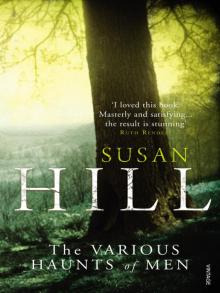 The Various Haunts of Men
The Various Haunts of Men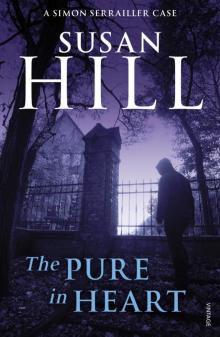 The Pure in Heart
The Pure in Heart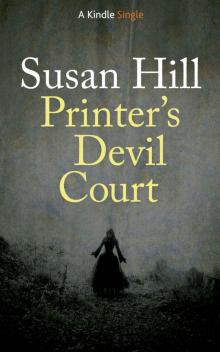 Printer's Devil Court
Printer's Devil Court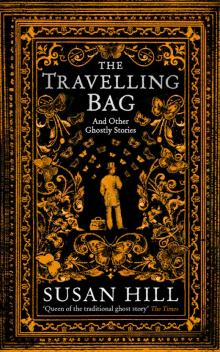 The Travelling Bag
The Travelling Bag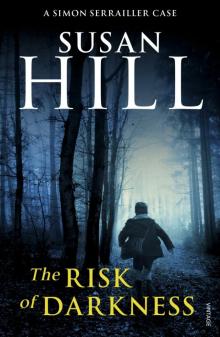 The Risk of Darkness
The Risk of Darkness A Kind Man
A Kind Man Black Sheep
Black Sheep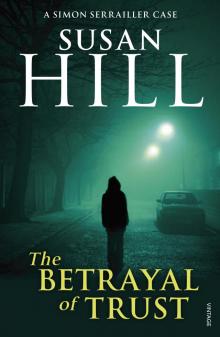 The Betrayal of Trust
The Betrayal of Trust The Service of Clouds
The Service of Clouds Betrayal of Trust
Betrayal of Trust The Small Hand
The Small Hand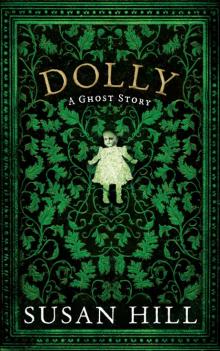 Dolly
Dolly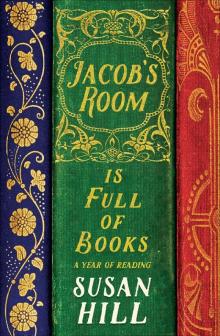 Jacob's Room Is Full of Books: A Year of Reading
Jacob's Room Is Full of Books: A Year of Reading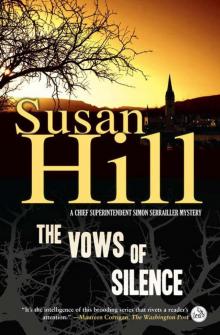 The Vows of Silence
The Vows of Silence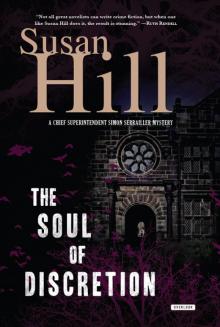 The Soul of Discretion
The Soul of Discretion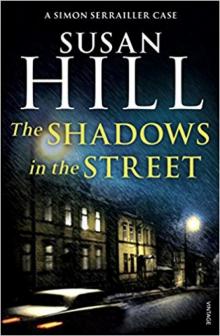 The Shadows in the Street
The Shadows in the Street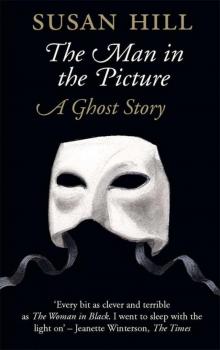 The Man in the Picture
The Man in the Picture Air and Angels
Air and Angels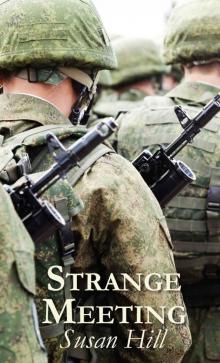 Strange Meeting
Strange Meeting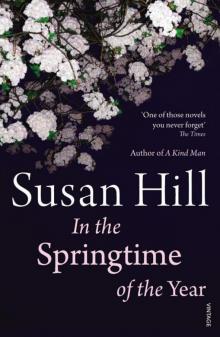 In the Springtime of the Year
In the Springtime of the Year Howards End Is on the Landing: A Year of Reading From Home
Howards End Is on the Landing: A Year of Reading From Home From the Heart
From the Heart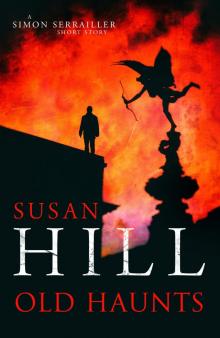 Old Haunts
Old Haunts The Mist in the Mirror
The Mist in the Mirror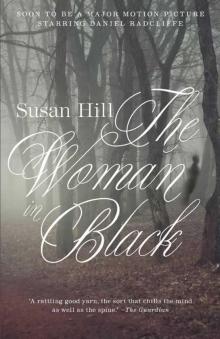 The Woman in Black: A Ghost Story
The Woman in Black: A Ghost Story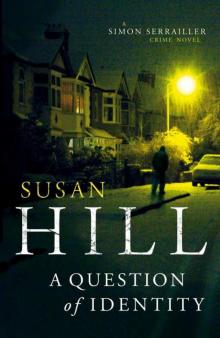 A Question of Identity (Simon Serrailler 7)
A Question of Identity (Simon Serrailler 7)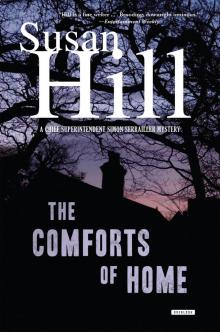 The Comforts of Home
The Comforts of Home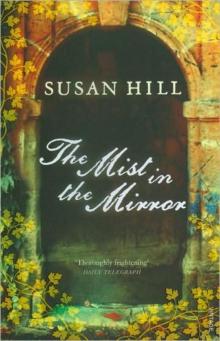 Mist in the Mirror
Mist in the Mirror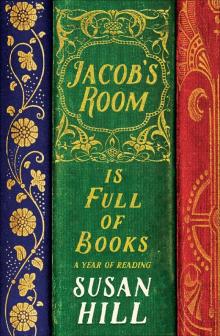 Jacob's Room is Full of Books
Jacob's Room is Full of Books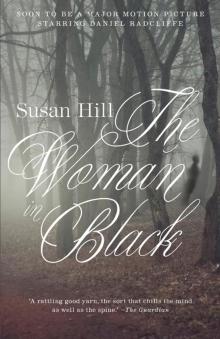 The Woman in Black
The Woman in Black Howards End is on the Landing
Howards End is on the Landing